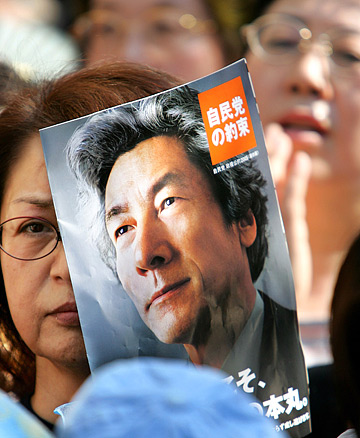
ASSOCIATED PRESS
Holding a copy of the ruling Liberal Democratic Party's manifesto bearing a portrait of its leader, Prime Minister Junchiro Koizumi, a supporter listened to Koizumi during his election campaign for the LDP in Tokyo the day before the Sept. 11, 2005, parliamentary elections.
|
|
Who will succeed Koizumi?
As japan's leader prepares to retire, several candidates come into play
LOOK EAST
JAPAN'S most effective prime minister since Kakuei Tanaka (1972-1974), the flamboyant, unconventional, Elvis Presley-mimicking Junichiro Koizumi, will step down as prime minister in September. During his five-year tenure, he exerted greater control over his Liberal Democratic Party's feuding "habatsu," or factions; stabilized Japan's financial system; privatized Japan's postal system, thus creating the world's largest bank, with deposits of $3 trillion; and won endless praise from the U.S. government by bringing about a more internationally active role for Japan's Self-Defense Forces, which sent 600 troops to Iraq. His relationship with President Bush rivals that of Bush's relationship with British Prime Minister Tony Blair.
THE CONTENDERS

Shinzo Abe:
Former foreign minister, very conservative, strongly anti-communist and pro-Taiwan
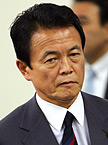
Taro Aso:
Current foreign minister, strongly anti-communist and pro-U.S.
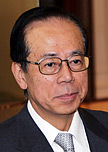
Yasuo Fukuda:
Former chief cabinet secretary, a foreign policy realist, favored by business community
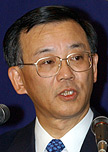
Sakakazu Tanigaki:
Finance minister, a lawyer, considered the most intellectual
|
No one is perfect, and neither is Koizumi. While he reinvigorated the Japanese economy by instituting tax cuts for the very wealthy, deregulating and limiting public works expenditures, the Japanese middle class is contracting. Once known as the society where everyone thought of themselves as "middle class," social cleavage is beginning to appear, as is the appellation "a society of haves and have-nots."
The world's second-wealthiest country continues to experience record-setting budget deficits - just like the world's wealthiest nation, the United States. Due to his unyielding stance on visiting Yasukuni Shrine, where 14 World War II Class A war criminals are memorialized, Japan's relations with China and South Korea are frozen in acrimony.
THE JAPANESE prime minister is not directly elected by Japanese voters. Instead, he is elected by members of the majority party in the Diet (Parliament), where there are 404 LDP members. The LDP members are not necessarily of one mind due to the role of the factions in Japanese parliamentary politics. Given the often overwhelming presence of the LDP in the Diet, members organize into factions to more effectively advance or block legislation, to secure campaign funds and to give them a greater chance of securing a ministerial position. Factions are often led by former premiers. Due to 1996 changes in Japanese electoral law creating single-member districts in place of multimember districts and the stern leadership Prime Minister Koizumi exercised over the entire LDP, factions do not have their former influence. Nevertheless, factions influence members' vote for premier and are a critical factor in election strategy. In addition, selection of the premier is dependent on the votes of 300 local party support groups. The candidate with a majority of votes moves into the premier's residence. Koizumi has not expressed any particular support for a successor, although many observers feel he supports Shinzo Abe. Overt support might be a plus, but given that many have tired of his strong-willed leadership, it could just as well be a negative.
According to Tsuneo Watanabe of the Mitsui Global Strategic Studies Institute, speculation on Koizumi's successor focuses on four longtime politicians: Shinzo Abe, Yasuo Fukuda, Taro Aso and Sadakazu Tanigaki.
AT THE MOMENT, 52-year-old Chief Cabinet Secretary Shinzo Abe is the favorite. The CCS position is an extremely important one in Japanese politics and might be likened to the White House chief of staff. In Japan's case, many of those who have served in the position went on to become prime minister. Abe is also a former foreign minister whose father, Shintaro Abe, served in the same position and nearly made it to the premier's office. His grandfather was Nobuske Kishi, a former premier and suspected World War II war criminal who was very friendly to the United States.
Like his grandfather, Abe is very conservative, deeply contemptuous of communists, strongly pro-Taiwan and believes his duty is to protect Japanese people. Some believe Abe has been too uncompromisingly supportive of Koizumi's visits to Yasukuni Shrine. Abe is a member of the large Mori faction. A June 27 poll conducted by the Asahi Shimbun tallied 45 percent of respondents preferring Abe.
A FORMER CCS who resigned in May 2005 admitting that he was not making payments to the national pension plan, 69-year-old Yasuo Fukuda is the second-most favorite to succeed Koizumi. Also politically conservative, Fukuda is the son of former Japanese Premier Takeo Fukuda. Before entering electoral politics in 1990, he worked as a section chief at Maruzen Oil Co., as a political secretary to his father and as a director of the Kinzai Institute for Financial Affairs. Fukuda is a strong supporter of "Nichibei kankei" (Japanese-American relations); however, like his father, his greatest attribute might well be his concern for improving Japan's flagging relationship with Asia.
Takeo Fukuda is remembered for the "Fukuda Doctrine," which sought to clarify Japan's Asian policy by recommitting Japan to nonmilitarism, building a close relationship with the Association of Southeast Asian Nations, and serving as a bridge between ASEAN and Indochina.
Fukuda is a foreign-policy realist who understands that poor relations with China are hurting Japan. Since Japan's economic recovery drew a good deal of momentum from the robust Chinese market, Fukuda is a favorite of the Japanese business community, although Abe remains more popular with the Japanese man on the street. Speculation is rife about a "New Fukuda Doctrine" that would serve as a bridge between the original Fukuda Doctrine and a future East Asian community. Fukuda is also a member of the Mori faction, which Koizumi also belonged to, who has objected to the premier's visits to Yasukuni Shrine. Asahi Shimbun polling results pegged Fukuda's support at 25 percent.
TARO ASO, 65, currently serves as Japan's foreign minister. Other ministerial portfolio that he has held include economic and fiscal planning plus internal affairs and communication. Outside of politics, he was president and CEO of Aso Mining, a family business. Like his rivals, Aso's family has a deep history in Japanese politics. His grandfather Shigeru Yoshida is arguably Japan's best-known and most revered postwar premier and is largely credited for the nation's economic recovery and subsequent economic growth. Moreover, Yoshida minimized the role of Japan's military and incubated Japan's security dependence on the United States.
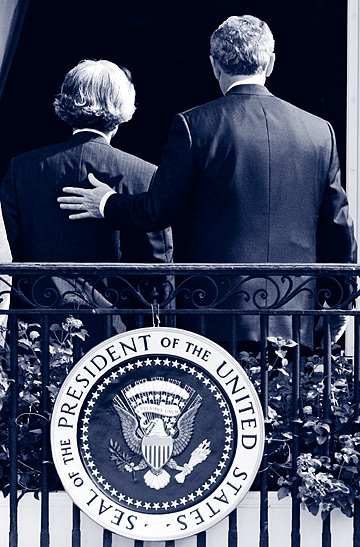
ASSOCIATED PRESS
President Bush put his hand on Japanese Prime Minister Junchiro Koizumi's back as they walked from the Truman balcony during an arrival ceremony June 29 at the White House.
|
|
Aso is strongly anti-communist and pro-Washington. Unswervingly supportive of his boss's visits to Yasukuni Shrine, Aso is not well regarded in Asian countries. In fact, his tenure as foreign minister has seen relations with both China and Korea go into deep freeze. He is ever skeptical of China's military buildup and once stated that during Japan's colonial rule in Korea that Koreans wanted Japanese names; in reality it was Japanese policy to have Koreans adopt Japanese names. Aso is a member of the small Kono faction. The June 27 poll registered 5 percent support for Aso.
Minister of Finance Sadakazu Tanigaki, 61, previously was minister of science and technology, minister of reconstruction and minister of industrial revitalization. He also has worked as a lawyer. Unlike the others, no family member of his became a political household name. Nevertheless, Tanigaki inherited his Diet seat from his father, who also served as a minister of education.
HISTORICALLY, a high percentage of Japan's politicians and bureaucrats are Faculty of Law, University of Tokyo graduates; however, Tanigaki is the only one in this group of candidates. Perhaps that helps to explain why he is considered the most intellectual and best liked by omnipotent bureaucrats. Yet, his popularity among the general public is low since he believes that Japan's highly unpopular consumption tax must be increased to further secure Japan's economic recovery. Some observers comment that Tanigaki's advocacy of an increased consumption tax is indicative of bureaucrats' influence on him at a time when Japanese politics seems to be less molded by government officials. As he is considered the most pro-China candidate, Japan's right wing, a pillar of the LDP, feels he is likely to be too soft on China. Tanigaki leads his own small faction of 15. With 3 percent support in the Asahi Shimbun poll, Tanigaki has the largest margin to make up.
Whoever wins will be up against a wall of problems. Mitsuru Mizuno, a retired Japan Development Bank executive who is now a professor in the graduate business program at Nihon University, says those problems include keeping up the economic recovery, increasing employment opportunities, shoring up the medical insurance and national pension system, and improving Japan's relations with China and South Korea.
Bill Sharp is adjuct professor of East Asian international relations at Hawaii Pacific University. He writes a monthly column for the Star-Bulletin.

